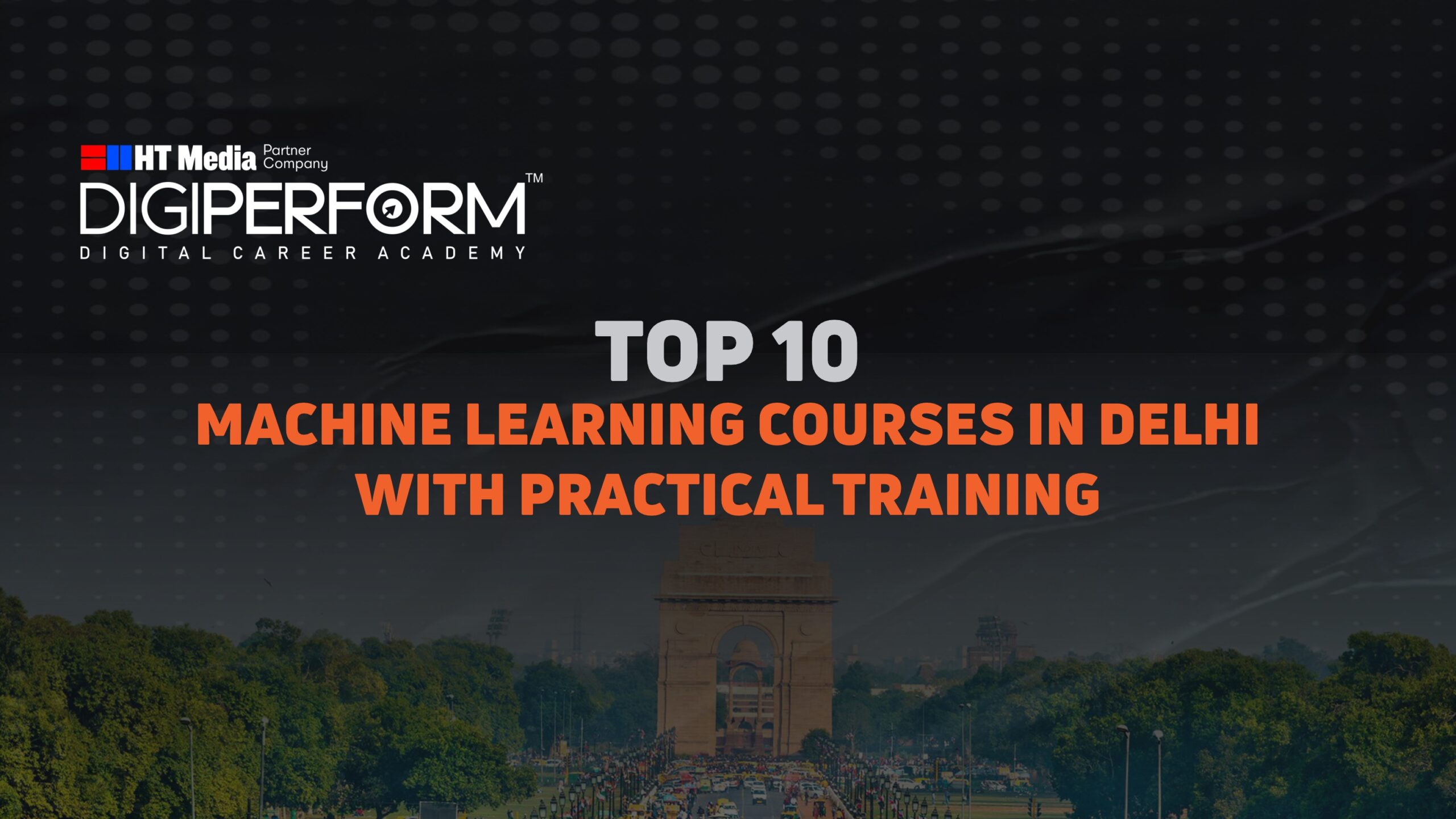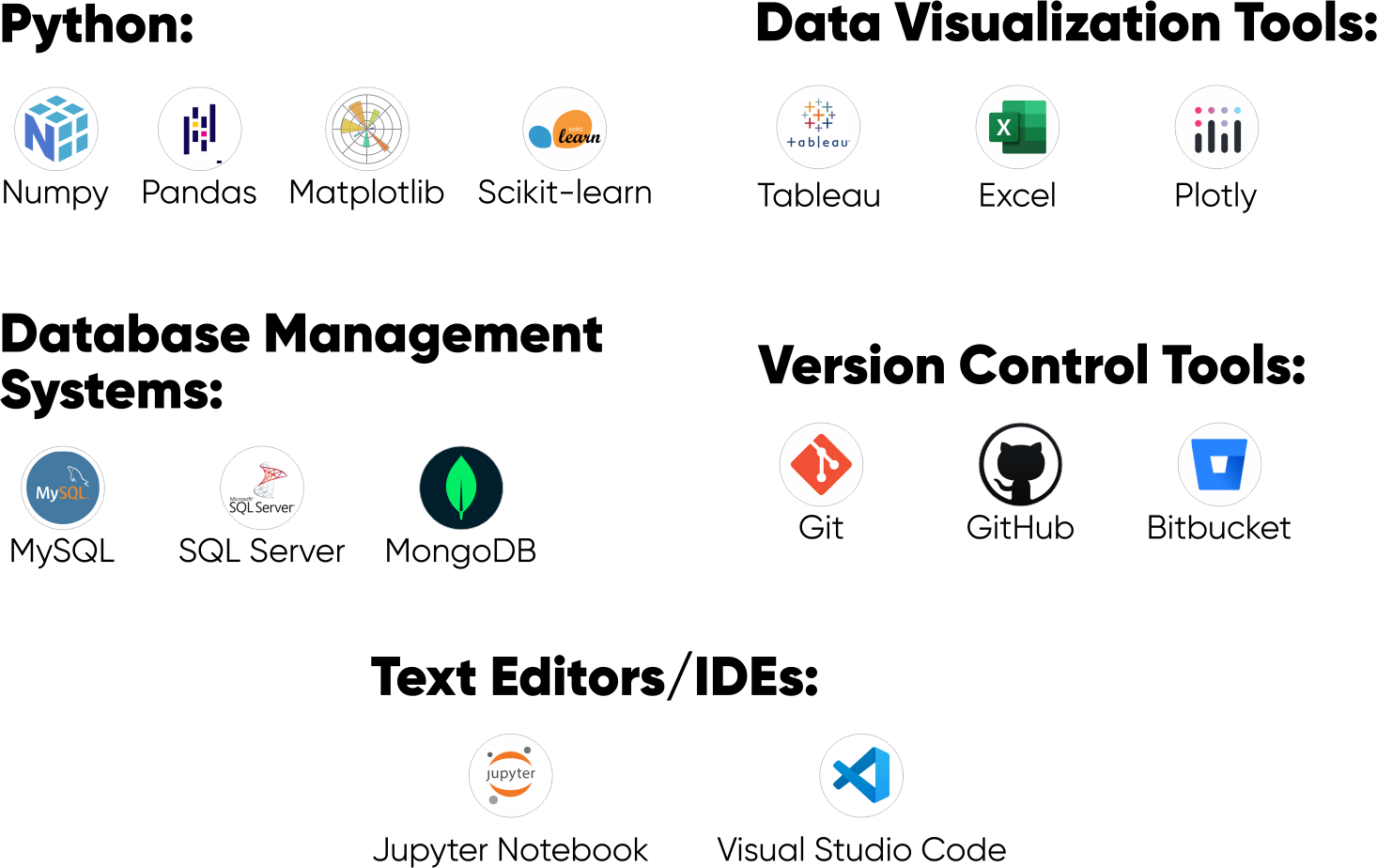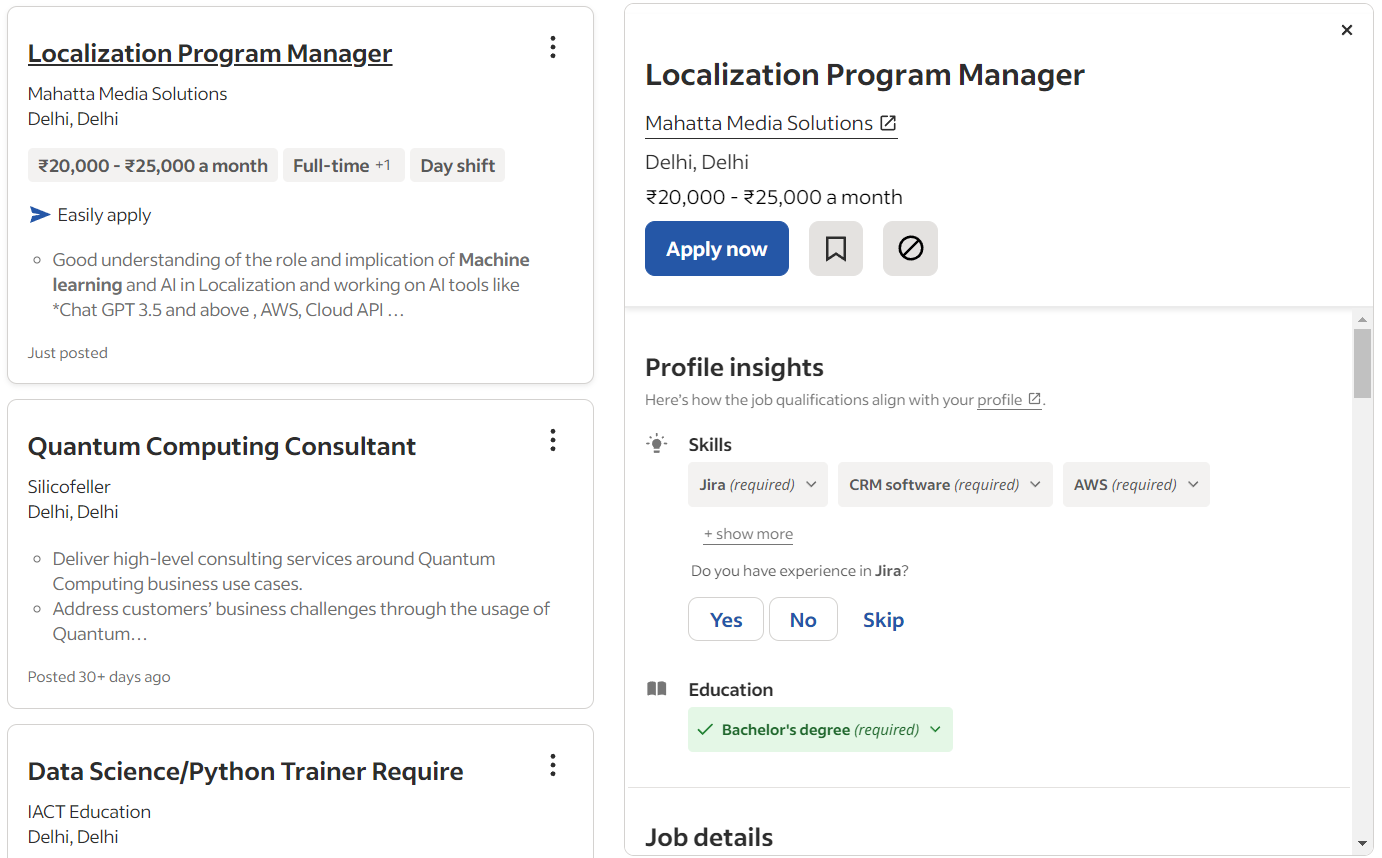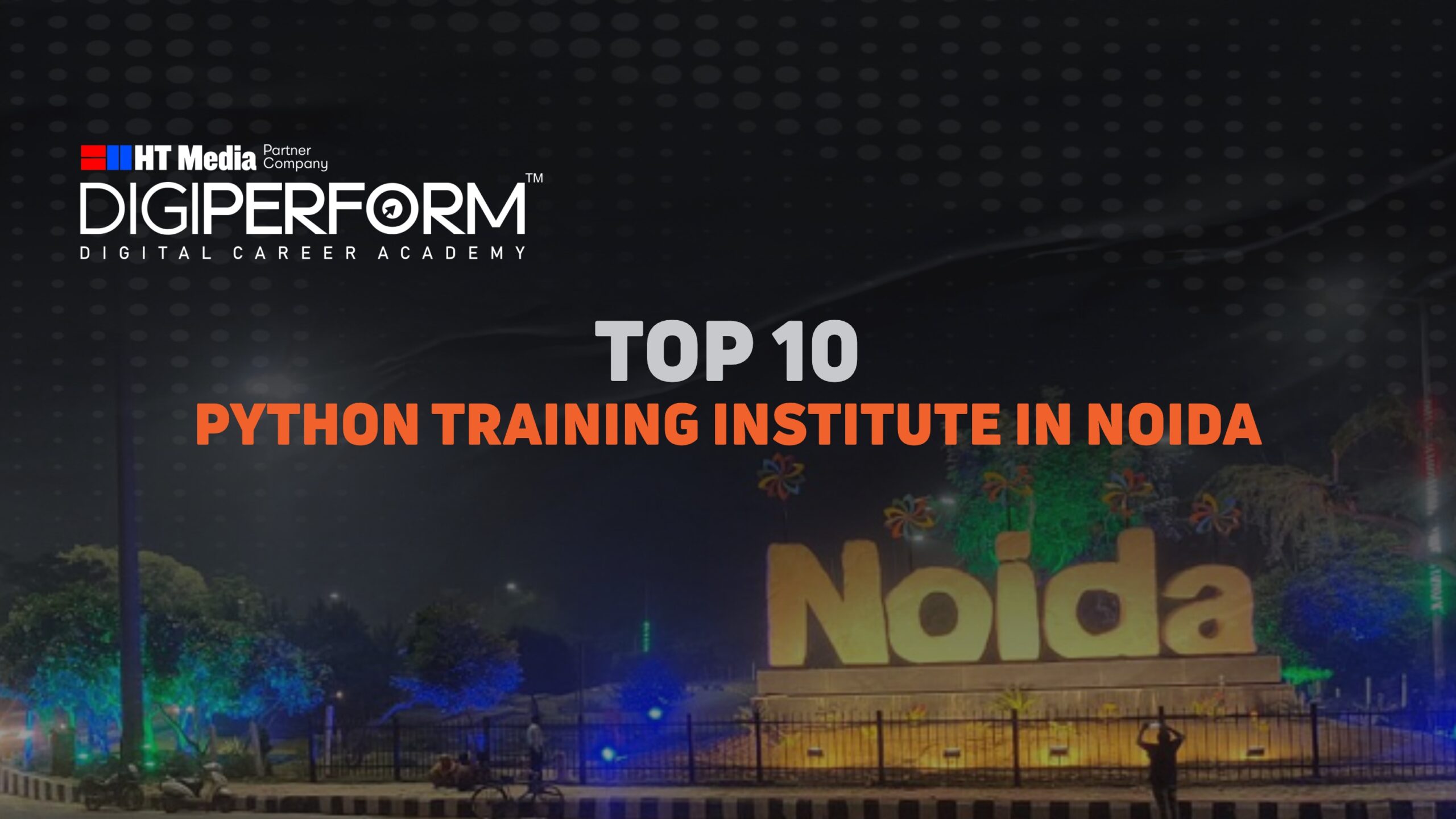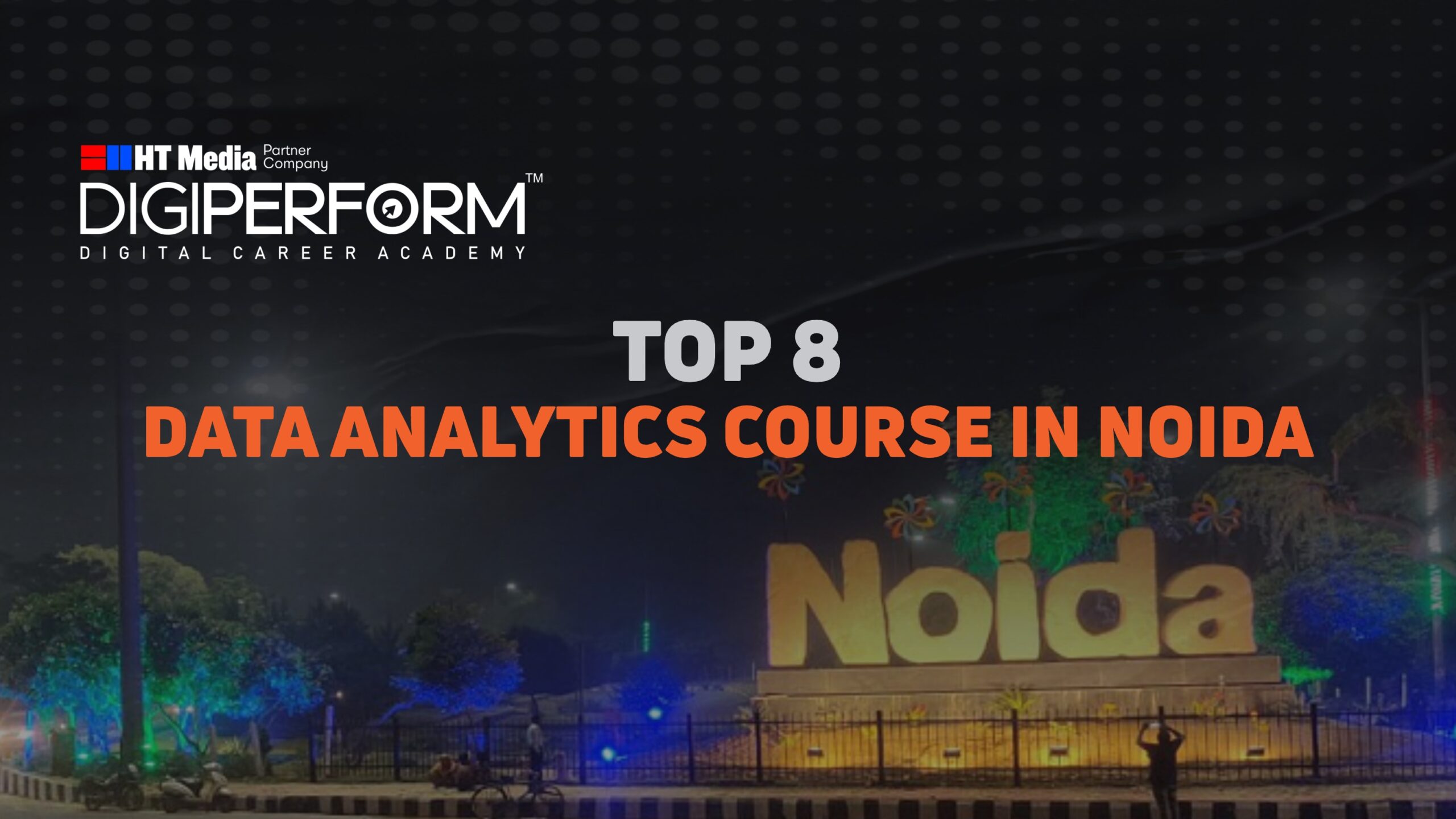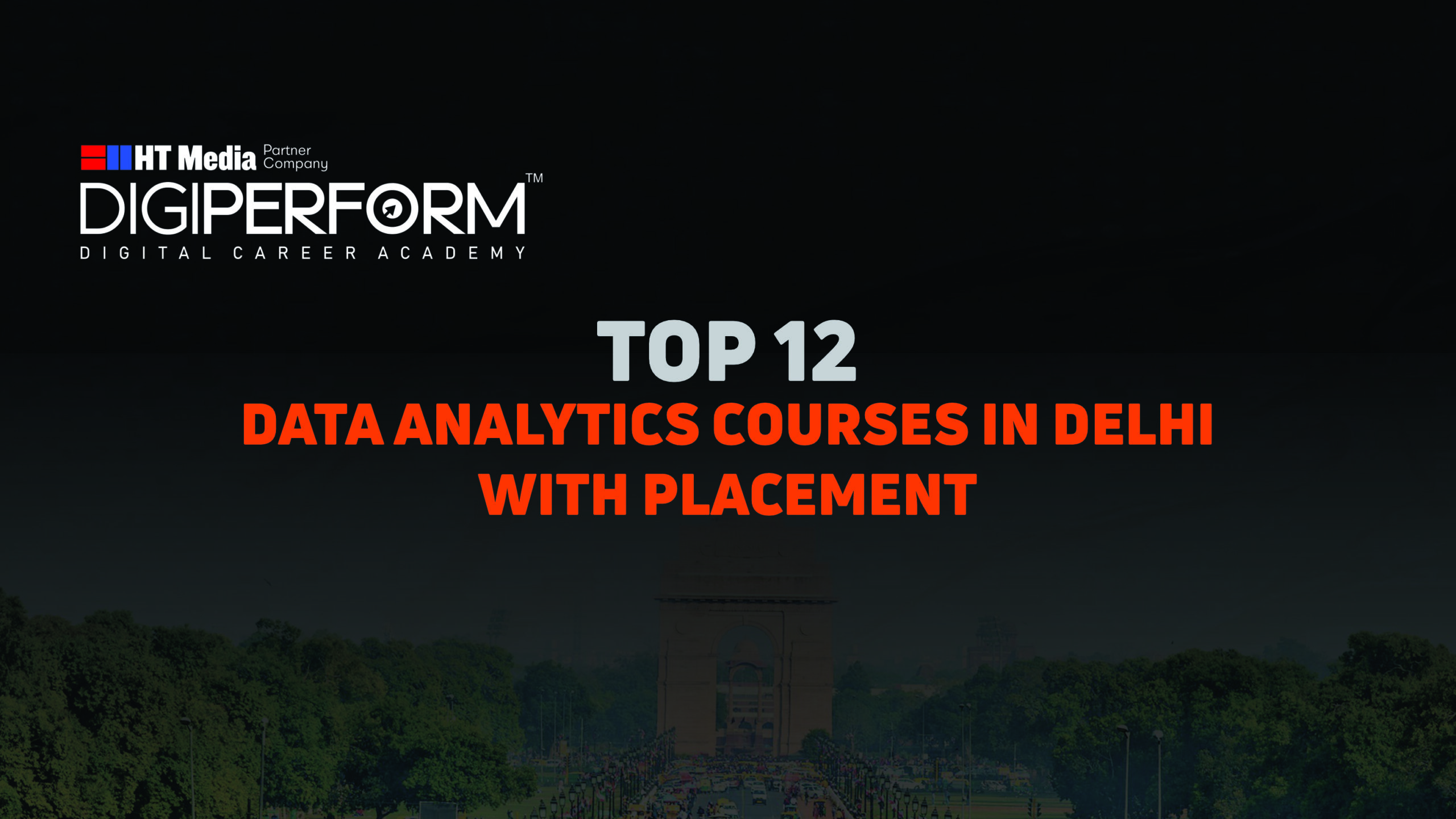Master
Machine Learning Courses in Delhi
India’s Only Data Science Training Program created to help you to build a successful career in Data Science from scratch.
Top 10 Machine Learning Courses in Delhi With Practical Training
Machine learning is transforming industries globally and Modern is no exception. The demand for skilled machine learning professionals is soaring and several machine learning institutes in Delhi offer top-notch courses to meet this demand. This article explores the top 10 Artificial intelligence and Machine learning courses in Delhi focusing on practical training course fees and comprehensive curriculum offerings.
List: Top 10 Machine Learning Courses in Delhi With Practical Training
| Institute Rank | Name | Training Delivery Type | Offering Course Since | Fees | Placement Assistance |
| 1 | Digiperform- Digital Career Academy | Online & Offline | 2013 | INR 30k-90k | 100%* |
| 2 | Vcaretechnical Institute | Online/ Offline | 2014 | INR 35k-65k Approx | 100% |
| 3 | PortLearn Institute | Online/ Offline | NA | INR 35k-50k | 100% |
| 4 | Eagletflysolutions Institute | Online/ Offline | 2017 | INR 35k-45k | 100% |
| 5 | Analytixlabs | Online/ Offline | 2014 | INR 30k-60k | 100% |
| 6 | 4Achievers institute | Online/ Offline | 2012 | INR 25k-50k | 100% |
| 7 | Learnbay Institute | Online/ Offline | 2015 | INR 50k-125k | 100% |
| 8 | Niit Institute | Online/ Offline | NA | NA | 100% |
| 9 | Itvedant Institute | Online/ Offline | 2018 | INR 25k-50k | 100% |
| 10 | upGrad | Online | 2015 | INR 50k-120k | 100% |
Curriculum, Fee and Course Highlights: Top 10 Machine Learning Courses in Delhi
1. DIGIPERFORM
Best Machine Course learning in Delhi is at the forefront of technological advancements driving innovation across various industries. As the demand for skilled machine learning professionals continues to grow Digiperform has developed a comprehensive machine learning course designed to equip learners with the necessary skills and knowledge. This blog explores Digiperform’s machine learning course highlighting its curriculum practical training components course fees and career opportunities.
At Digiperform, our Machine Learning curriculum is expertly designed to equip students with the essential skills for roles in both small and large organizations with in-house Python teams. We emphasize hands-on learning, integrating practical exercises, research, and assignments to ensure a comprehensive and practical educational experience.
Why Choose Digiperform’s Machine Learning Course in Delhi?
- Expert Faculty: Learn from experienced professionals and industry experts.
- Practical Training: Gain hands-on experience with real-world projects and case studies.
- Comprehensive Curriculum: Covers a wide range of topics from basic concepts to advanced machine learning techniques.
- Career Support: Benefit from placement assistance and career guidance.
Why you should learn Machine Learning in Delhi?
Learning Machine Learning in Delhi with Digiperform offers unparalleled opportunities. Delhi is a hub for tech innovation and home to numerous leading companies with in-house Python development teams.
Our curriculum is designed to provide hands-on learning through practical exercises, research, and assignments, ensuring you gain the skills needed for success in both small and large organizations. Plus, you’ll benefit from networking in a vibrant tech community.
Benefits of Artificial Intelligence and Machine Learning courses in Delhi
- Quality Education: Delhi boasts numerous prestigious institutes known for their quality education and experienced faculty.
- Industry Connections: Being a major metropolitan area Delhi offers ample networking opportunities with industry professionals and organizations.
- Diverse Course Offerings: From basic to advanced levels you can find a variety of machine learning courses tailored to your needs.
Practical Training and Real-World Projects
One of the standout features of Digiperform’s machine learning course is its emphasis on practical training. Students have the opportunity to work on real-world projects and case studies allowing them to apply their theoretical knowledge in practical scenarios. This hands-on experience is crucial for developing a deep understanding of machine learning concepts and techniques.
Data Science Course Syllabus
Module 1: Introduction to Data Science | Introduction to the Industry & Buzzwords Industrial application of data science Introduction to different Data Science Techniques Important Software & Tools Career paths & growth in data science |
Module 2: Introduction to Excel
| Introduction to Excel- Interface, Sorting & Filtering,
Excel Reporting- Basic & Conditional Formatting
Essential Excel Formulae
Layouts, Printing and Securing Files |
Module 3: Introduction to Stats
| Introduction to Statistics & It’s Applications Different types of Data Population vs Sample Sampling Techniques Intro: Inferential vs. descriptive statistics |
Module 4: Descriptive Stats Using Excel Datasets | Categorical Variables Visualization Using Excel Charts- FDT, Pie Charts, Bar Charts & Pareto Numerical Variables Visualization of Frequency & Absolute Frequency- Using Histogram, Cross Table & Scatter Plot Measure of Spread ( Mean, Mode , Median) Measure of Variance( Skewness, SD, Variance, Range, Coef. Of Variance, Bivariate Analysis, Covariance & Correlation) |
Module 5: Inferential Stats Using Excel Datasets | Introduction to Probability Permutation & Combinations Types of events Normal distribution Standard Normal distribution Normal vs. Standard Normal distribution Confidence Intervals & Z-Score Hypothesis Testing & It’s Types |
Module 6: Database Design & MySQL | Relational Database theory & Introduction to SQL MySQL Installation Database Creation in the MySQL Workbench Querying in MySQL Joins and Set Operations SQL Practice Case Study Window Functions Case Statements, Stored Routines and Cursors Ø Query Optimisation and Best Practices Ø Problem-Solving Using SQL |
Module 7: Data Visualization Using Advanced Excel
| Introduction LOOKUP functions Pivot Tables WHATIF Analysis Dashboard Creation Recording Macros Advanced Visualizations- PIVOT Charts, Sparklines, Waterfall Charts Data Analysis ToolPak – Regression in Excel |
Module 8: Data Visualization Using Tableau | Introduction to Tableau Introduction What is Data Analytics? Why Data Visualisation? What is Tableau? Why Tableau? Tableau vs Excel and PowerBI Exploratory and Explanatory Analysis Getting started with Tableau Visualizing and Analyzing data with Tableau – I Introduction Bar Charts Line Charts and Filters Area Charts Box plots and Pivoting Maps and Hierarchies Pie Charts Treemaps and Grouping Dashboards Visualizing and Analyzing Data with Tableau – II Introduction Joins and Splits Numeric and String functions Logical and Date functions Histograms and parameters Scatter Plots Dual Axis Charts Top N Parameters and Calculated Fields Stacked bar Charts Dashboards – II and Filter Actions Storytelling Summary |
Module 9: Python Programming
| Installing Anaconda & Basics of Python Introduction to programming languages Compiler vs Interpreter Getting Started With Python Introduction to jupyter Notebooks Identifiers, Keywords Print function Comment, Indentation Data Types Functions Understanding what are functions Defining and calling functions Local and global variables Different types of arguments Map,reduce,filter,lambda and recursive functions Data Structures in Python Introduction Lists Tuples Sets Dictionaries Practice Exercise Summary Operator Input and Output Different Arithmetic , logical and Relational operators Input, Output function Eval function Format Function Control Flow If elif else statement For and while loops Break , continue and Pass statement List and dictionary comprehensions Functions Understanding what are functions Defining and calling functions Local and global variables Different types of arguments Map,reduce,filter,lambda and recursive functions File Handling Purpose of file handling Different function in file handling (open,read, write,close) Different modes (r,w,a,r+,w+,a+) With block Exception Handling, OOPX & Regex What is exception handling Try, except, else and finally block Different types of Exception Concept of Oops Different functions in Regex Metacharacters in Regex |
Module 10: Python For Data Science | NumPy Introduction to NumPy Basics of NumPy Operations Over 1-D Arrays Practice Exercise I Multidimensional Arrays Creating NumPy Arrays Mathematical Operations on NumPy Mathematical Operations on NumPy II Computation Times in NumPy vs Python Lists Practice Exercise II Pandas Introduction to Pandas Basics of Pandas Pandas – Rows and Columns Describing Data Indexing and Slicing Operations on Dataframes Groupby and Aggregate Functions Merging DataFrames Pivot Tables Practice Exercise |
Module 11: Data Visualization Using Python- Matplotlib & Seaborn
| Introduction to Data Visualisation with Matplotlib Introduction to Matplotlib The Necessity of Data Visualisation Visualisations – Some Examples Facts and Dimensions Bar Graph Scatter Plot Line Graph and Histogram Subplots Choosing Plot Types Summary Data Visualisation: Case Study Introduction Case Study: Mind Map Case Study Overview Data Handling and Cleaning: I Data Handling and Cleaning: II Sanity Checks Outliers Analysis with Boxplots Histograms Summary Practice Questions Data Visualization with Seaborn Introduction Distribution Plots Styling Options Pie – Chart and Bar Chart Scatter Plots Pair Plots Revisiting Bar Graphs and Box Plots Heatmaps Line Charts Stacked Bar Charts Case Study Summary Plotly Practice Questions |
Module 12: Exploratory Data Analysis | Data Sourcing Module Introduction Introduction to EDA Public and Private Data Private Data Public Data Web Scraping-I Web Scraping-II Summary Data Cleaning Introduction Data Types Fixing the Rows and Columns Impute/Remove Missing Values Handling Outliers Standardising Values Fixing Invalid Values and Filter Data Practice Questions Summary Univariate Analysis Introduction to Univariate Analysis Categorical Unordered Univariate Analysis Categorical Ordered Univariate Analysis Statistics on Numerical Features Graded Questions Summary Bivariate and Multivariate Analysis Introduction Numeric – Numeric Analysis Correlation vs Causation Numerical – Categorical Analysis Categorical – Categorical Analysis Multivariate Analysis Graded Questions Summary Module Summary |
Module 13: Supervised Learning Model - Regression | Introduction to Simple Linear Regression Introduction to Simple Linear Regression Introduction to machine learning Regression line Best fit line Strength of simple linear regression Simple linear regression in python Assumptions of simple linear regression Reading and understanding the data Hypothesis testing in linear regression Building a linear model Residue analysis and predictions Linear Regression using SKLearn Multiple Linear Regression Motivation-when one variable is not enough Moving from SLR to MLR-new considerations Multi collinearity Dealing with categorical variables Model assessment in comparison Feature selection Multiple Linear Regression in Python Reading and understanding the data Data preparation Initial steps Building the model I & II Residue analysis and predictions Variable selection using RFE Industry Relevance of Linear Regression Linear regression revision Prediction versus projection Media company case study Exploratory data analysis Model building - I, II & III Assessing the model Interpreting the results |
Module 14: Supervised Learning Model - Classification | Univariate Logistic Regression Binary classification Sigmoid curve Finding the best fit sigmoid curve - I Finding the best fit sigmoid curve - II Odds and log Odds Multivariate Logistic Regression - Model Building Multivariate Logistic Regression - Model Building Data cleaning and preparation - I & II Building your first model Feature elimination using RFE Confusion metrics and accuracy Manual feature elimination Multivariate Logistic Regression - Model Evaluation Multivariate Logistic Regression - Model Evaluation Metrics beyond accuracy-sensitivity and specificity Sensitivity and specificity in Python Understanding ROC curve ROC curve in python Finding the optimal threshold Model evaluation metrics - exercise Precision and recall Making predictions Logistic Regression - Industry Applications - Part I Getting familiar with logistic regression Nuances of logistic regression-sample selection Nuances of logistic regression-segmentation Nuances of logistic impression-variable transformation-I, II & III Logistic Regression: Industry Applications - Part II Model evaluation - A second look Model validation and importance of stability Tracking of model performance over time Logistic Regression - Industry Applications - Part II Commonly face challenges in implementation of logistic regression Model evaluation - A second look Model validation and importance of stability Tracking of model performance over time |
Module 15: Advanced Machine Learning | Unsupervised Learning: Clustering Introduction to Clustering K Means Clustering Executing K Means in Python Hierarchical Clustering Business Problem Solving Introduction to Business Problem Solving Case Study Demonstrationchurn example Practice Questions Tree Models Introduction to Decision Trees Algorithms for Decision Tree Construction Hyperparameter Tuning in Decision Trees Ensembles and Random Forests Time Series Forecasting - I (BA) Introduction to Time Series Smoothing Techniques Time Series Forecasting - II (BA) Introduction to AR Models Building AR Models Model Selection Principles of Model Selection Model Building and Evaluation |
Module 16: AI- NLP, Neural Networks & Deep Learning | Introduction to NLP What is NLP? History and evolution of NLP Applications of NLP Challenges in NLP Overview of NLP pipeline Corpus and Corpus Linguistics NLTK Toolkit Introduction to the NLTK toolkit Preprocessing text data with NLTK Basic NLP tasks using NLTK (e.g., Part-ofSpeech Tagging, Named Entity Recognition) Stemming and Lemmatization WordNet in NLTK Chunking and Chinking Sentiment Analysis with NLTK Tokenization and Topic Modeling Tokenization in NLP Bag-of-Words representation Topic Modeling with LDA Latent Semantic Analysis Word Embeddings Sentiment Analysis Project: Introduction to Sentiment Analysis Sentiment Analysis using supervised and unsupervised methods Building a Sentiment Analysis model with Python Evaluating Sentiment Analysis models AI vs Deep Learning vs ML Introduction to Artificial Intelligence (AI), Machine Learning (ML) and Deep Learning (DL) Applications of AI, ML, and DL Differences between AI, ML and DL The Concept of Neural Networks Introduction to Neural Networks Types of Neural Networks Layers in Neural Networks Activation Functions Neural Networks - Feed-forward, Convolutional, Recurrent Feed-forward Neural Networks Convolutional Neural Networks Recurrent Neural Networks Applications of Neural Networks Deep Learning Project Building a Deep Learning model with Python Image Classification with Convolutional Neural Networks Natural Language Processing with Recurrent Neural Networks |
Data Science Projects and Assignments
Major Projects
Customer Lifetime Value Calculation: The project involves calculating the customer lifetime value using SQL to understand the revenue generated by a customer over their lifetime.
Customer Churn Prediction: This project involves building a predictive model using SQL to identify customers who are likely to churn based on their behavior and transaction history.
Interactive Dashboard for E-Commerce Sales: The project involves creating an interactive dashboard using Tableau & SQL to analyze retail sales data, identify trends, and make data-driven decisions.
Customer Segmentation Dashboard: This project involves creating a customer segmentation dashboard using Tableau to identify customer groups based on demographics, behavior, and purchasing patterns.
Movie Recommendation System: The project involves building a movie recommendation system using Python and its libraries such as Pandas, NumPy, and Scikit-Learn. The recommendation system will suggest movies based on user preferences and ratings.
Sentiment Analysis on Twitter Data: This project involves analyzing Twitter data using Python and its libraries such as NLTK and TextBlob to perform sentiment analysis and understand the overall sentiment of a particular topic.
Visualizing COVID-19 Data: The project involves visualizing COVID-19 data using Python and its libraries such as Matplotlib, Seaborn, and Plotly to understand the impact of the pandemic on different countries and regions.
Visualizing Stock Market Data: This project involves visualizing stock market data using Python and its libraries such as Pandas, Matplotlib, and Bokeh to understand the trends and patterns in stock prices over time.
Airbnb Data Analysis: The project involves performing exploratory data analysis on Airbnb data to understand the patterns in the pricing, availability, and quality of Airbnb listings in different cities.
Bike Sharing Data Analysis: This project involves performing exploratory data analysis on bike sharing data to understand the usage patterns of bikes in different cities and identify factors that influence bike usage.
House Price Prediction: The project involves building a regression model using Python and its libraries such as Scikit-Learn to predict the prices of houses based on their features such as location, size, and amenities.
Credit Risk Prediction: This project involves building a classification model using Python and its libraries such as Scikit-Learn to predict the credit risk of loan applicants based on their credit history and other factors.
Time Series Forecasting for Sales Data: The project involves building a time series forecasting model using advanced machine learning algorithms such as ARIMA and LSTM to predict future sales trends and identify factors that influence sales.
Sentiment Analysis on Product Reviews: The project involves building a sentiment analysis model using NLP techniques such as Word Embeddings and Recurrent Neural Networks (RNN) to analyze product reviews and understand the sentiment of customers towards different products.
Segmentation using Deep Learning: This project involves using advanced deep learning techniques such as Fully Convolutional Networks (FCN) and U-Net to perform image segmentation and identify objects in images.
Machine Translation using Transformers: This project involves building a machine translation model using advanced deep learning techniques such as Transformers to translate text from one language to another.
Case Studies & Assignments:
- Healthcare Customer Feedback Analysis
- Management Teams Dashboard Creation
- Retail Store Sales Report Analysis
- Software Firm Employee Data Analysis
- Industrial Data Sets Classification & Comparison
- Charts & Graphs: Frequency Distribution Table, Pie-charts, Pareto Diagram, Histogram, Scatter Plots, Heatmaps, Bar Graphs and many More.
- Patient Disease Probability Analysis Using Healthcare Data
- Car Model & Menu Item Data Combination & Configuration Probability Analysis
- Manufacturing & Product Launch Data Classification & Analysis
- Customer Complaint Resolution Analysis Using Normal Distribution Curves
- Product Rating & Employee Productivity Analysis Usign Z-Score
- New Product Need Analysis Using Hypothesis Testing
- Inventory Management & Customer Segmentation Systems Using Vlook up & Hlook Lookup
- Sales Trend & Staffing Plan Creation using Pivot Tables
- Pricing Strategy & Financial Model Creation Using What if Analysis
- Sales & Operations Dashboard Creation
- Healthcare & Construction Reporting Automation Using Macros
- Retail Sales Opportunity Analysis Using PIVOT Charts
- Accounting Firm Statement Analysis Using Sparklines & Waterfall Chart
- FMCG Marketing Spend to Sales Revenue Impact Analysis Using Regression Analysis
- Transportation Pricing Model Using Regression Analysis
Data Science Placements
100% * Placement Assistance Dedicated Placement Cell To Help You Land Your Dream Job
Data science course fees
Master Program in Data Science Fees: 30k-90k
Contact Information
Digiperform Corporate Office: C-30, Third Floor, Sector-2, Near Sec-15 Metro Station, Noida, Uttar Pradesh 201301, India
Email: contact@digiperform.com
Phone: +91-966 -755-1500
Website: www.digiperform.com
2. Vcare Technical Institute
In today’s data-driven world, the best machine learning Course in Delhi has become an essential ability for people across industries.
If you want to obtain experience in this cutting-edge subject Vcare Technical Institute in Delhi offers a thorough machine learning training that will provide you with the required skills and knowledge.
This blog digs into the machine learning course at Vcare Technical Institute focusing on the curriculum practical training components course expenses and employment options it provides.
Course Highlights
- Comprehensive coverage of machine learning algorithms and techniques.
- Practical training with hands-on projects and real-world case studies.
- Gain insights from seasoned faculty and industry mentors.
- Flexible learning options: online and offline modes available.
- Robust career support with placement assistance and career counseling.
Course Curriculum
- Introduction to Machine Learning
- Data Preprocessing
- Machine Learning Algorithms
- Advanced Machine Learning Techniques
- Deep Learning
- Natural Language Processing (NLP)
- https://vcaretechnicalinstitute.com/ai-ml-course/
- Capstone Project
| Name | Machine Learning Course |
| Course Duration | 12 Months |
| Website | https://vcaretechnicalinstitute.com/ai-ml-course/ |
| Address: | Pradhan Complex E7 / 101 Block J Vishwakarma Park Laxmi Nagar New Delhi Delhi 110092 |
| Avg. Google Rating: | 5 |
| Offering Machine learning Course in Delhi Since: | 2014 |
| Fees | INR 150000 |
| Branches in India: | 5 |
| Exclusive Machine learning Institute: | No |
| Flagship Course Names: | Advanced Business Analytics |
| Training Delivery Model | Online & Offline |
3. PortLearn Institute
PortLearn Institute is a premier educational establishment dedicated to providing top-notch training in machine learning and artificial intelligence.
Located in the heart of Delhi, PortLearn Institute has earned a reputation for its high-quality courses, experienced faculty and industry-oriented curriculum.
Portlearn’s best machine learning course in Delhi is meticulously designed to cover all essential aspects of machine learning ensuring that students are well-prepared to tackle industry challenges.
Course Highlights
- Introduction to Machine Learning
- Programming for Machine Learning
- Data Preprocessing
- Supervised Learning
- Unsupervised Learning
- Reinforcement Learning
- Deep Learning
- Model Evaluation and Optimization
- Real-world Applications
| Name | Machine Learning Course |
| Course Duration | NA |
| Website | https://www.portlearn.com/artificial-intelligence/ |
| Address: | Office 24, S-515, First Floor, School Block, Laxmi Nagar, Shakarpur, Delhi – 110092 |
| Avg. Google Rating: | 4.9 |
| Offering Machine learning Course in Delhi Since: | 2019 |
| Fees | INR 50000 |
| Branches in India: | 5 |
| Exclusive Machine learning Institute: | No |
| Flagship Course Names: | NA |
| Training Delivery Model | Online & Offline |
4. Eagletfly solutions Institute
In the current era dominated by data, machine learning leads the charge in technological advancements. EagletFly Solutions Institute is emerging as a premier destination for individuals seeking to gain expertise in machine learning training in Delhi. This blog explores the various machine learning courses offered by EagletFly Solutions highlighting their curriculum, practical training components and career prospects.
Course Highlights
- Data preprocessing and exploratory data analysis.
- Application of machine learning in business.
- Fundamentals of neural network
- Convolutional and recurrent neural networks.
| Name | Machine Learning & Ai |
| Course Duration | 6 month |
| Website | https://eagletflysolutions.com/courses/artificial-intelligence-machine-learning/ |
| Address: | Near Gate No. 2 of the Metro Station at 14/1, East Patel Nagar, close to Patel Nagar, New Delhi, Delhi 110008. |
| Avg. Google Rating: | 4.8 |
| Offering Machine learning Course in Delhi Since: | 2018 |
| Fees | INR 35000 |
| Branches in India: | 1 |
| Exclusive Machine learning Institute: | No |
| Flagship Course Names: | NA |
| Training Delivery Model | Online & Offline |
5 . Analytixlabs
This program is designed to equip you with practical hands-on skills in Machine Learning covering the most widely used techniques. You will start with an introduction to ML and progress to learning both supervised and unsupervised methods including text mining and natural language processing.
Key techniques covered include linear and logistic regression decision trees ensemble learning support vector machines k-nearest neighbors naive Bayes neural networks clustering and principal component analysis among others.
AnalytixLabs offers Machine Learning Training in Delhi that is meticulously designed to provide a deep understanding of machine learning concepts and their practical applications.
Course Highlights
- In-depth coverage of machine learning algorithms and techniques.
- Real-time projects and industry case studies.
- Practical sessions using popular tools and technologies like Python R and TensorFlow.
- Experienced faculty and industry mentors.
- Placement assistance and career support.
| Name | Python Machine Learning Course |
| Course Duration | 6 month |
| Website | https://www.analytixlabs.co.in/machine-learning-course-certification-training |
| Address: | Metro Gate 3 A 78 1st Floor A Block Sector 2 Noida Uttar Pradesh 201301 |
| Avg. Google Rating: | 4.7 |
| Offering Machine learning Course in Delhi Since: | 2015 |
| Fees | INR 50.000 |
| Branches in India: | 5 |
| Exclusive Machine learning Institute: | No |
| Flagship Course Names: | NA |
| Training Delivery Model | Online & Offline |
6. 4Achievers Institute
To announce the upcoming application cycle for the 4Achievers best Machine Learning course in Delhi Summer Internship Program in India. We seek talented and passionate individuals who share our vision of transforming India’s workforce by bringing together professionals from various industries and understanding what drives them.
In today’s data-driven world selecting the right Machine Learning talent is crucial for enhancing development, streamlining internal processes and optimizing marketing strategies. At 4Achievers you can trust that our internship program will be filled with high-quality interns possessing a diverse set of skills ranging from analytics to advanced machine learning techniques.
Course Highlight
- What is Machine Learning?
- What are the different types of Machine Learning algorithms?
- What is supervised learning?
- What is unsupervised learning?
- What is reinforcement learning?
- What are the most popular Machine Learning algorithms?
- How can Machine Learning be used to solve problems?
- What is the difference between supervised and unsupervised learning?
| Name | Machine Learning Course |
| Course Duration | 6 month |
| Website | https://4achievers.com/machine-learning-training |
| Address: | Veer Savarkar Block, Block A, Shakarpur Khas, New Delhi, Delhi 110092 |
| Avg. Google Rating: | 4.5 |
| Offering Machine learning Course in Delhi Since: | 2012 |
| Fees | INR 25.000 |
| Branches in India: | 10 |
| Exclusive Machine learning Institute: | No |
| Flagship Course Names: | NA |
| Training Delivery Model | Online & Offline |
7. Learnbay Institute
In the fast-changing world of technology, machine learning has become a crucial area that influences various sectors, including healthcare and finance.
For those looking to break into this exciting domain, Learnbay Institute offers an exceptional machine learning course designed to equip students with both theoretical knowledge and practical skills.
This blog will delve into the specifics of the machine learning course at Learnbay highlighting its curriculum features and benefits.
Course Highlight
- Introduction to Machine Learning
- Data Preprocessing
- Machine Learning Algorithms
- Deep Learning
- Natural Language Processing (NLP)
- Model Deployment and Production
| Name | Data Science Course in Delhi |
| Course Duration | 6 month |
| Website | https://www.learnbay.co/datascience/delhi/data-science-course-training-in-delhi |
| Address: | Business Centre Arunachal Building 6th floor Barakhamba Rd New Delhi Delhi 110001 |
| Avg. Google Rating: | 4.6 |
| Offering Machine learning Course in Delhi Since: | 2012 |
| Fees | INR 50000 |
| Branches in India: | NA |
| Exclusive Machine learning Institute: | No |
| Flagship Course Names: | NA |
| Training Delivery Model | Online & Offline |
8. NIIT Institute
In today’s digital age machine learning (ML) has emerged as one of the most transformative technologies across various industries. As businesses increasingly rely on data-driven decisions the demand for skilled professionals in machine learning continues to rise. NIIT Institute, a leading name in education and training offers a comprehensive Machine Learning course designed to equip learners with the necessary skills and knowledge.
Course Highlight
The Machine Learning course in Delhi at NIIT is tailored for individuals looking to delve into the world of ML whether you’re a beginner or someone with a technical background. The program encompasses a diverse array of subjects, including…
Introduction to Machine Learning
- Data Preprocessing
- Algorithms and Models
- Model Evaluation and Tuning
- Real-world Applications
| Name | Data Science & Machine Learning |
| Course Duration | 6 month |
| Website | https://www.niit.com/india/knowledge-center/Data-Science/ML |
| Address: | 1st Floor Chawla House 19 Nehru Place New Delhi Delhi 110019 |
| Avg. Google Rating: | 5 |
| Offering Machine learning Course in Delhi Since: | NA |
| Fees | INR 50.000 |
| Branches in India: | NA |
| Exclusive Machine learning Institute: | No |
| Flagship Course Names: | NA |
| Training Delivery Model | Online & Offline |
9. Itvedant Institute
In today’s fast-paced digital world Artificial intelligence and Machine learning courses in Delhi are not just buzzwords; they are essential skills that can elevate your career. At Itvedant The Institute we offer a specialized Machine Training course designed to equip you with the knowledge and skills needed to thrive in this exciting field.
Itvedant stands out for its commitment to providing high-quality education in emerging technologies. Our Machine Learning Training in Delhi course combines theoretical knowledge with practical experience ensuring that you gain a comprehensive understanding of machine learning concepts and applications.
Course Highlights
- Introduction to Machine Learning
- Supervised and Unsupervised Learning
- Neural Networks and Deep Learning
- Natural Language Processing (NLP)
- Model Deployment and Optimization
| Name | Data Science & Analytics with AI Course |
| Course Duration | 6 month |
| Website | https://www.itvedant.com/data-science |
| Address: | 13 Ground Floor, opposite Manav Medicare Center, Block F, South Extension I, New Delhi, Delhi 110049. |
| Avg. Google Rating: | 4.8 |
| Offering Machine learning Course in Delhi Since: | 2014 |
| Fees | INR 45000 |
| Branches in India: | NA |
| Exclusive Machine learning Institute: | No |
| Flagship Course Names: | NA |
| Training Delivery Model | Online & Offline |
10. UpGrad Institute
Machine learning algorithms develop mathematical models using historical data known as training data which enables them to make predictions or decisions without explicit programming. This field merges computer science with statistics to build predictive models.
Essentially machine learning involves creating or utilizing algorithms that learn from previous data; the more data provided the better the outcomes. Through machine learning businesses and industries can analyze trends and identify new customer-focused opportunities.
Course Highlight
- About Machine Learning
- What is a Machine Learning Course?
- Who Should Do a Machine Learning Course?
- When to do a Machine Learning Course?
- Duration of Machine Learning Courses
- Hands-on Learning
- Expert Faculty
- Career Support
| Name | Online Artificial Intelligence & Machine Learning Programs |
| Course Duration | 6 month |
| Website | https://www.upgrad.com/machine-learning-course/ |
| Address: | 266, Okhla Phase 3 Rd, Okhla Phase III, Okhla Industrial Estate, New Delhi, Delhi 110020 |
| Avg. Google Rating: | 4.3 |
| Offering Machine learning Course in Delhi Since: | 2015 |
| Fees | INR 50000 |
| Branches in India: | NA |
| Exclusive Machine learning Institute: | No |
| Flagship Course Names: | NA |
| Training Delivery Model | Online |
What is Machine Learning?
Machine learning is a subset of artificial intelligence that focuses on developing algorithms and statistical models that enable computers to perform specific tasks without explicit instructions. Instead, these systems learn from data patterns and make predictions or decisions based on that information. Techniques such as supervised learning, unsupervised learning, and reinforcement learning are commonly used in this field.
Importance of Machine Learning
Career In Machine Learning
Completing Digiperform’s machine learning course opens up a plethora of career opportunities in various fields. With the skills and knowledge gained students can pursue roles such as:
Data Scientist: Analyze and interpret complex data to help companies make informed decisions.
Machine Learning Engineer: Design and develop machine learning algorithms and systems.
AI Specialist: Focus on the development and implementation of artificial intelligence solutions.
Business Analyst: Use data-driven insights to drive business strategies and improvements.
Mastering Machine Learning Tools
Mastering machine learning tools is essential for anyone looking to excel in this field. Key tools include programming languages like Python and R, frameworks such as TensorFlow and PyTorch, and libraries like Scikit-learn and Keras. Additionally, proficiency in data visualization tools, cloud platforms, and version control systems is crucial for effective model development and deployment.
Machine Learning Salaries for Freshers in Delhi
As of 2024, the salary for machine learning freshers in Delhi varies based on the company and the individual’s qualifications. Here is a general table of average starting salaries:
| Job Role | Average Salary (Per Annum) |
| Machine Learning Engineer | ₹6,00,000 – ₹8,00,000 |
| Data Scientist | ₹5,50,000 – ₹7,50,000 |
| AI Researcher | ₹6,00,000 – ₹8,00,000 |
| Data Analyst (with ML skills) | ₹5,00,000 – ₹6,50,000 |
Current Job Openings in Machine Learning in Delhi
If you’re exploring career opportunities in machine learning in Delhi, you’ll find plenty of promising options available for skilled professionals like yourself. Numerous companies are actively seeking machine learning experts to develop and maintain advanced applications. Whether your skills are in algorithm development, data analysis, or model training, there’s likely a role that suits your expertise.
From established tech giants to innovative startups, Delhi’s job market is rich with potential. If you’re ready to embark on a career in machine learning, the city offers numerous opportunities. You can check out job listings on platforms like Naukri.com, LinkedIn.com, and Indeed.com to find the right fit for your skills.
FAQs: Machine Learning Course in Delhi
What is the duration of Digiperform's machine learning course in Delhi?
The length of the course depends on the specific program chosen. The basic course lasts for 3 months, the advanced course for 6 months and the comprehensive course for 9 months.
Are there any prerequisites for enrolling in machine learning?
Basic knowledge of programming and statistics is recommended but not mandatory. The course begins with fundamental principles and gradually advances to more complex topics.
Does Digiperform provide certification upon completion?
Yes students receive a certificate upon successfully completing the course which is recognized by industry professionals and employers.
What kind of support is available for students during the Course?
Students have access to 24/7 support including instructor guidance online resources and peer forums. Digiperform also offers career counseling and placement assistance.
Can I enroll in the course if I am working full-time?
Indeed, Digiperform provides adaptable learning options, featuring weekend and evening sessions designed to suit the needs of working professionals.
